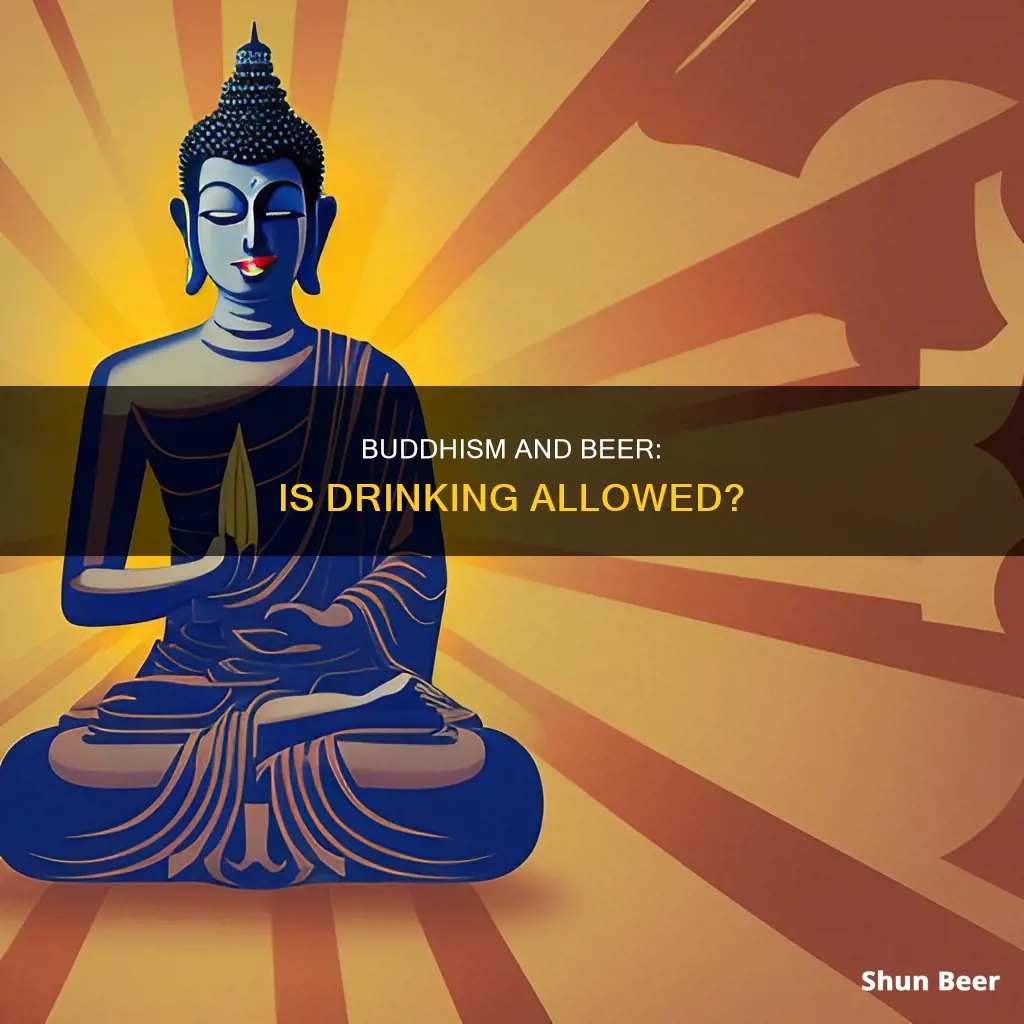
The consumption of alcohol by Buddhists is a controversial topic, with different Buddhist traditions and practitioners holding varying views on the matter. The fifth Buddhist precept, which forms the basis of Buddhist ethics, calls on followers to abstain from intoxicants that induce a state of carelessness. However, the interpretation of this precept differs among Buddhist schools and practitioners.
Some Buddhists interpret the fifth precept strictly, refraining from all forms of alcohol as it is believed to cloud the clarity of the mind and hinder spiritual development. This view is particularly prominent in the Theravadin school of Buddhism, which is centred in Southeast Asian countries with significant Buddhist populations, such as Thailand, Myanmar, and Sri Lanka.
On the other hand, some Buddhist traditions, such as Zen Buddhism, emphasise understanding the spirit of the precepts rather than adhering rigidly to their words. From this perspective, social drinking or having a beer or glass of wine is acceptable as long as one remains mindful of oneself and others and does not compromise their clarity of mind. This approach is known as mindful drinking and is practised in the Vajrayana tradition.
Ultimately, the consumption of alcohol by Buddhists varies depending on the individual's interpretation of the precepts and their personal relationship with substances.
| Characteristics | Values |
|---|---|
| The Fifth Precept | "I undertake the training rule to abstain from fermented and distilled intoxicants which are the basis for heedlessness" |
| The Fifth Precept in Theravada Buddhism | A clear prohibition of drinking |
| The Fifth Precept in Mahayana Buddhism | Not treated as an absolute prohibition |
| The Fifth Precept in Tibetan and Vajrayana Buddhism | Alcohol is viewed as a potential aide for the practitioner |
| The Fifth Precept in Zen Buddhism | "I vow not to intoxicate the mind or body of self or others, but to promote clarity and awareness" |
What You'll Learn
- Drinking alcohol is not forbidden in all Buddhist traditions
- Some Buddhists drink alcohol as part of their religious practice
- The intention behind drinking is important to some Buddhists
- Some Buddhists believe that drinking alcohol is incompatible with the Buddhist quest to understand and develop the mind
- Some Buddhists believe that drinking alcohol is acceptable in moderation

Drinking alcohol is not forbidden in all Buddhist traditions
In the Vajrayana tradition, also known as the "diamond vehicle", alcohol can be consumed as part of "mindful drinking." This practice involves using alcohol as a tool to loosen the subtle clinging of the ego and achieve a state of relaxation and appreciation for one's surroundings. However, it is important to note that this practice is only recommended for advanced practitioners who have already developed basic Buddhist discipline and the intention to dedicate their lives to benefiting others.
The Tibetan tradition also incorporates alcohol in the bi-monthly ceremony known as tsog. While monastics are expected to uphold the vow of refraining from intoxicants, laypeople may occasionally enjoy a glass of wine. The key distinction is between intoxication, where one's clarity is compromised, and simply partaking of a substance.
Additionally, some Mahayana Buddhists interpret the Fifth Precept, which pertains to abstaining from intoxicants, more broadly to include anything that distracts us from the path, not just alcohol and drugs. This can include coffee, tea, chewing gum, sweets, sex, sleep, power, fame, and even food. The decision to abstain from alcohol entirely or drink in moderation is an individual one that requires spiritual maturity and self-honesty.
Drinking Beer on Manhattan Streets: Is It Legal?
You may want to see also

Some Buddhists drink alcohol as part of their religious practice
The consumption of alcohol is a controversial topic within Buddhism, with some Buddhists choosing to abstain from drinking altogether. However, some Buddhists do drink alcohol as part of their religious practice, viewing it as a tool for loosening the subtle clinging of the ego and achieving enlightenment. This practice, known as "mindful drinking", is rooted in the Vajrayana tradition of Tibetan Buddhism.
According to the basic Buddhist teachings, alcohol is considered a poison that clouds the inherent clarity of the mind. However, in the Vajrayana tradition, these prohibitions are re-evaluated once a meditator has developed basic Buddhist discipline and adopted the intention to dedicate their life to benefiting others. At this advanced stage of practice, alcohol is viewed not as an escape but as a tool for spiritual growth.
The key to mindful drinking lies in the intention behind it. It is not about getting intoxicated or losing control but about using alcohol mindfully to relax and appreciate one's surroundings. The practitioner must have strong discipline and a clear intention to avoid falling into the trap of excessive drinking.
The practice of mindful drinking is often done in the context of elaborate group rituals called vajra feasts, where alcohol is consumed alongside meat. These rituals serve to transform confusion into wisdom and liberate the wisdom within the confusion. By including substances like alcohol that are typically forbidden, practitioners confront negativity directly and find a way to include it in their spiritual practice.
However, it is important to note that the interpretation of the Fifth Precept, which discourages intoxicants, varies between different Buddhist traditions. While some schools of Buddhism may allow for mindful drinking, others interpret the precept as a clear prohibition against any alcohol consumption. Ultimately, the decision to drink or not depends on the individual's spiritual maturity and self-honesty.
Drinking Beer in Public: Japanese Laws and Customs Explained
You may want to see also

The intention behind drinking is important to some Buddhists
The fifth precept is a guideline for correct and moral behaviour, and it is up to the individual to interpret and follow it. Some Buddhists believe that drinking alcohol is acceptable as long as it is done in moderation and with mindfulness. They argue that a small amount of alcohol can help to relax and open up, without clouding the mind. This view is often held by laypeople rather than monks or nuns.
However, other Buddhists interpret the fifth precept as a strict prohibition against any alcohol consumption. They believe that alcohol is a poison that clouds the mind and can lead to breaking other vows. This interpretation is more common among monks and nuns, who have taken vows of abstinence.
The context and intention behind drinking are crucial for Buddhists who follow the Vajrayana tradition. In this tradition, alcohol is viewed as a tool to loosen the ego's subtle clinging rather than as a conventional escape. Practitioners of this tradition believe that once an individual has developed basic Buddhist discipline and the intention to dedicate their life to helping others, they can incorporate Vajrayana teachings, which re-evaluate the simple prohibitions outlined in traditional sutras.
The intention behind drinking is a key factor for Buddhists who follow the Vajrayana tradition. They believe that if the intention is to dull the mind or become drunk, it is considered an offence. However, if the intention is to enjoy a substance mindfully and without craving, it may be acceptable.
Overall, the intention behind drinking is a significant consideration for Buddhists, and different traditions and individuals may interpret the fifth precept differently. Some may choose to abstain completely, while others may allow for moderate drinking with mindfulness and intention.
Mixing Beer and Wine: What's the Harm?
You may want to see also

Some Buddhists believe that drinking alcohol is incompatible with the Buddhist quest to understand and develop the mind
The consumption of alcohol is a controversial topic within Buddhism, with different traditions and individual Buddhists holding contrasting views on the matter.
The interpretation of the Fifth Precept varies between different Buddhist traditions, such as Theravada and Mahayana Buddhism. In Theravada Buddhism, the Fifth Precept is generally understood as a clear prohibition against drinking alcohol, with some allowing for medicinal use or small amounts in food. In contrast, Mahayana Buddhists often interpret the precept more broadly, considering anything that distracts from the path, such as coffee, tea, or even power or fame, as potential intoxicants.
Some Buddhists also point to the teachings of the Buddha himself, who is said to have taught that monks should not consume alcohol. Additionally, the historical context of Buddhism, particularly in Southeast Asian countries with a history of colonialism, has influenced the view that alcohol consumption is incompatible with Buddhist teachings. Temperance movements led by Buddhists in these regions have further reinforced the association between Buddhism and abstinence from alcohol.
However, it is important to note that not all Buddhists abstain from alcohol completely. Some practitioners may choose to drink in moderation or engage in "mindful drinking", where alcohol is viewed as a tool for loosening the ego's grip rather than a means of escape. This practice is often associated with the Vajrayana tradition and is typically undertaken by experienced meditators with strong discipline and clear intentions.
Ultimately, the decision to drink or abstain from alcohol is a personal one for Buddhists, requiring spiritual maturity and self-honesty. While some may choose to abstain completely, others may find a middle path that allows for occasional social drinking or the ceremonial use of alcohol within a sacred context.
Arnold's Beer Drinking: A Surprising Revelation
You may want to see also

Some Buddhists believe that drinking alcohol is acceptable in moderation
The interpretation of the fifth Buddhist precept on drinking alcohol varies across different Buddhist traditions. While some Buddhists believe in a complete ban on alcohol, others support moderate drinking.
Interpretations of the Fifth Precept
The fifth Buddhist precept, as translated from the Pali Canon, is "I undertake the training rule to abstain from fermented and distilled intoxicants which are the basis for heedlessness". The interpretation of this precept differs between Theravada and Mahayana Buddhism.
Theravada Buddhism considers the Fifth Precept to be a clear prohibition of drinking. According to Bhikkhu Bodhi, the precept requires an intoxicant, an intention to take an intoxicant, the activity of ingesting the intoxicant, and the actual ingestion of the intoxicant. However, taking medication containing alcohol or other intoxicants for medical reasons is not considered a violation.
Mahayana Buddhism, on the other hand, treats the Fifth Precept not as an absolute prohibition but as a guideline. Within Mahayana, the meaning of "intoxicant" is broadened to include anything that distracts followers from the path, not just limited to alcohol and drugs. Zen teacher Reb Anderson explains that anything ingested, inhaled, or injected without reverence for life can become an intoxicant. This includes not just alcohol but also coffee, tea, chewing gum, sweets, sex, sleep, power, fame, and even food.
Mindful Drinking
The Tibetan Vajrayana tradition incorporates alcohol in its practices. In this tradition, once a meditator has developed basic Buddhist discipline and the intention to dedicate their life to benefiting others, they are ready to incorporate Vajrayana teachings, which re-evaluate the simple prohibitions outlined in traditional sutras. In this context, alcohol is viewed not as an escape but as a tool to loosen the subtle clinging of the ego.
The practice of "mindful drinking" involves bringing full awareness to every sip, with the goal of loosening the ego's grip without compromising clarity of mind. However, it is acknowledged that the line between utility and abuse can be hard to define, and even Buddhists can struggle with mindful drinking in social contexts.
Individual Perspectives
Some Buddhists believe that the intention behind drinking is crucial. If the intent is to dull the mind or become drunk, it is considered an offence. However, if the intention is to simply enjoy the substance without losing clarity, some Buddhists believe that occasional drinking is acceptable.
Others argue that even a small amount of alcohol can impair mindfulness and is therefore contradictory to Buddhist practice. They believe that alcohol consumption, even in moderation, is inconsistent with the Buddhist quest to understand and develop the mind.
In conclusion, while some Buddhists interpret the fifth precept as a strict prohibition on alcohol, others believe that moderate drinking is acceptable as long as it does not lead to intoxication or compromise one's mindfulness and clarity of mind. The interpretation varies depending on the specific Buddhist tradition and individual perspectives.
Mixing Beer and Wine: What's the Harm?
You may want to see also
Frequently asked questions
The answer depends on the individual and the specific tradition they follow. Some Buddhists choose to abstain from alcohol completely, while others may consume it in moderation or as part of a sacred ritual. The basic Buddhist teachings on alcohol consumption state that alcohol is a poison that clouds the clarity of the mind. However, some Buddhists believe that drinking in moderation is acceptable as long as it does not lead to intoxication or loss of control. There are also certain Buddhist traditions, such as Vajrayana Buddhism, that incorporate alcohol into their rituals and practices. Ultimately, the decision to drink beer or not is a personal one for Buddhists, and there is no single answer that applies to all practitioners.
The main argument for Buddhists not drinking beer or any other form of alcohol is based on the fifth Buddhist precept, which is translated from the Pali Canon as "I undertake the training rule to abstain from fermented and distilled intoxicants which are the basis for heedlessness." This precept is interpreted as a guideline to prevent heedlessness and clouding of the mind, which can lead to breaking other vows or straying from one's integrity. Additionally, alcohol is considered to have negative effects on health and can increase the risk of certain cancers.
Some Buddhists argue that the fifth precept should be interpreted with flexibility and that complete abstinence from alcohol is not necessary. They believe that drinking in moderation is acceptable as long as it does not lead to intoxication or loss of control. In the Tibetan Vajrayana tradition, for example, alcohol is viewed as a potential tool for practitioners to loosen the subtle clinging of the ego. Additionally, some Buddhists may consume alcohol as part of sacred rituals, such as the vajra feast in Vajrayana Buddhism, where it is seen as a means of transmuting poison into medicine and finding wisdom within confusion.







